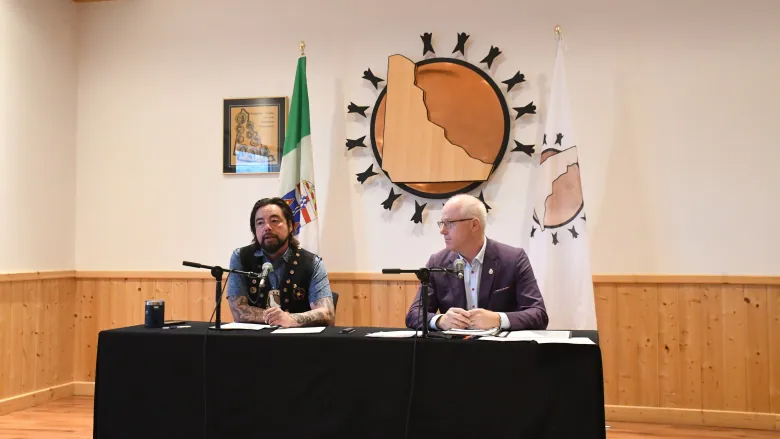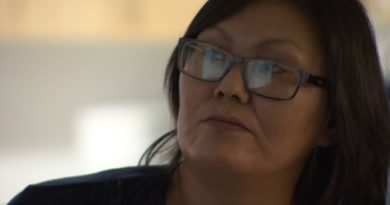Yukon government’s First Nations procurement policy now in full effect

‘Reconciliation includes tangible actions to build economic opportunities for Yukon First Nations’
The Yukon government’s First Nations procurement policy, which gives advantages to Yukon First Nations-owned businesses and businesses that employ First Nations workers when bidding on government contracts, is now in full effect.
The policy was first introduced in February and has been gradually phased in. The latest and final measures include the creation of a verified Yukon First Nations business registry and bid-value reductions for eligible companies.
“[For] far too long, we’ve seen where investments have come to our small communities and minimal dollars have been left on the table for our citizens,” Council of Yukon First Nations Grand Chief Peter Johnston said at a press conference with the Yukon government on Oct. 4.
“… With the procurement policy now in place and in full effect … we’re excited to see some of the possibilities that will come through.”
He added that the process hadn’t been easy, “but at the end of the day, we were able to pull this out of the ditch.”
Yukon highways and public works minister Nils Clarke described the policy as a “win for all Yukoners” as well as “an important step in our territory’s journey towards reconciliation.”
“Reconciliation includes tangible actions to build economic opportunities for Yukon First Nations,” he said. “This policy will create these opportunities.”
Chamber will be ‘very diligent’ with verification process, executive director says
The verified Yukon First Nations business registry is being managed by the Yukon First Nations Chamber of Commerce, which, according to executive director Albert Drapeau, has already received 35 applications.
Drapeau said the chamber will have the first iteration of the registry available online on Dec. 1, and aims to process future applications within 15 business days after that.
Businesses who want to be added to the registry will have to submit supporting documentation, which Drapeau said could include proof of Yukon First Nations citizenship and shareholder agreements.
“We will be very diligent with that,” he said of the verification process.
Bid-value reductions can shave off 15 per cent of a bid
Meanwhile, the Yukon government is introducing bid-value reductions for contracts. Eligible businesses, including Yukon First Nations-owned or partially-owned businesses as well as companies who use Yukon First Nation labour, can have between five to 15 per cent shaved off portions of their bids, increasing their competitiveness. The reduction amount is tied to the level of participation from Yukon First Nations businesses and people — the greater the participation, the greater the reduction.
For example, a business could put in a $100,000 bid for a Yukon government contract. If $50,000 of that was allocated to pay Yukon First Nations workers, 15 per cent would be deducted from that. Fifteen per cent could also be deducted from the remaining $50,000 if the company was completely Yukon-First-Nations-owned. That means when comparing bids, the Yukon government would treat the company’s bid as if it were $85,000 when comparing prices. If the company’s awarded the contract, however, the government would pay the full, pre-deduction price.
Katie Munroe, the director of the Yukon government’s procurement support centre, said the government would be hosting training sessions for businesses on bid-value reductions over the next four weeks. As well, a committee made up of the Yukon government, Yukon First Nations and industry representatives will be meeting monthly to track the effectiveness of the policy overall, and produce an annual report containing results and recommendations.
“Up until today… [the] government hasn’t been able to definitively say how much of the government spend has been going to Yukon First Nations-owned businesses,” Munroe said.
“… We’ll be able to start collecting data on how much money is going to those businesses. We’ll also be able to start collecting data with respect to Yukon First Nations employment through our contracts, and the goal in the long run is to see those numbers increasing.”
Related stories from around the North:
Canada: Nunavik tourism reopening reason for optimism, vaccination uptake still a concern, Eye on the Arctic
Greenland: Inuit in Canada, Alaska and Greenland found international business association, Eye on the Arctic
Norway: Svalbard nixes submarine, helicopter activities offered by luxury Arctic cruises, The Independent Barents Observer
Sweden: Indigenous reindeer herders request emergency aid after drought, wildfires ravage Sweden, Eye on the Arctic
United States: How the International Inuit Business Association wants to transform commerce in the Arctic, Eye on the Arctic


